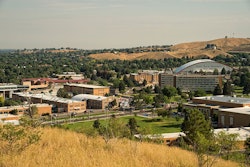Making the transition from high school to college can be challenging for many students, but for neurodiverse students in particular — who face cognitive, learning and physical disabilities — the adjustment can be even more complicated.
 Dr. James L. “Jim” Cherney
Dr. James L. “Jim” CherneyAccording to experts, existing stigmas often deter students from seeking additional resources or classroom accommodations.
“The problem with neurodiversity is not neurodiversity,” said Dr. James L. “Jim” Cherney, an associate professor in the Department of Communications Studies at the University of Nevada, Reno (UNR). “It is the structures and the systems that we built in our society that are essentially ableist, that don’t take into account things like different ways of thinking and different ways of relating.”
Looking to eliminate misconceptions around the neurodiverse population, seven faculty members at UNR implemented the Neurodiversity Alliance last semester.
The network of students, faculty and staff develops and shares resources to address the learning needs of neurodiverse individuals on campus. To obtain a more comprehensive understanding of those needs, the alliance plans to conduct a university-wide survey.
In his public speaking courses, for example, Cherney allows students to use a small number of notecards to teach extemporaneous speech — though this technique is not beneficial to every individual. One student, who was on the autistic spectrum, asked to use drawings and photographs rather than written words.
“There are a lot of people who would be very effective, learn a lot and be very active in the classroom if we provide them with the kinds of accommodations that they need in order to participate in ways that are appropriate for them,” said Cherney.
While UNR focused on raising awareness around neurodiversity, institutions such as Touro College in New York sought to address the challenges brought on by the COVID-19 pandemic for elementary, middle, high school and college students.
The transition to online learning exacerbated existing disparities, with many students lacking WiFi. Additionally, a lack of transportation prevented many families with neurodiverse students from accessing in-person services. The responsibility was placed on parents to address their childrens’ learning and behavioral needs all the while completing remote coursework.
To solve this issue, Touro was awarded a $45,000 grant from the Carvel Foundation to provide support for low-income families with neurodiverse children. Beginning in August, families will receive customized training sessions from a student intern and licensed supervisor to learn about behavior modification and aggression reduction.
“We are hoping this grant will open the door to empower the parents to be able to have a better quality of life or access to the supports that are out there, that you’re feeling intimidated to go in,” said Dr. Karrie Lindeman, program director and assistant professor in the Applied Behavior Analysis program at The School of Health Sciences of Touro College.
Centered around assisting autistic students with navigating the college landscape, Marquette University established the On Your Marq program. Since its establishment three years ago, the program has a 100% retention rate and expanded from five to 16 students. The first set of students are set to graduate in 2022.
The initiative offers academic, social, independent-living and mental health support through coaching, tutoring and peer mentorship.
While coaches work to map out weekly course assignments, peer mentors connect students to social activities. Students can also learn about course and professor expectations through one another.
“Even though mentorships are sometimes really one sided at the beginning, by midterm, a really almost natural friendship forms among our whole group because of our social space that they spend time in,” said Emily Raclaw, program director of On Your Marq.
The program also hosts required weekly seminars to discuss topics such as social skills and employment.
 Emily Raclaw
Emily RaclawLooking to increase preparedness for college and the workforce, students are encouraged to work on campus.
“Many of our students haven’t worked before coming to college,” said Raclaw. “One of the biggest predictors of being successful in a career is having work experience. If you’ve never even worked at the front desk of a residence hall before you graduate, for example, how does that translate into working in a real office when you’ve never had any work experience?”
Additionally, juniors and seniors participate in internships, engage in research or volunteer in laboratories.
To be eligible, students must first be accepted into Marquette before completing an additional application for On Your Marq. The cost per semester is $3,000, though scholarship funding is available.
Raclaw has seen many students transform into more independent individuals and advocates for themselves.
“The best part for me is just seeing these students who probably never had the chance to just really be themselves, figure things out on their own without someone telling them which way to do something,” she added.
Sarah Wood can be reached at [email protected].















